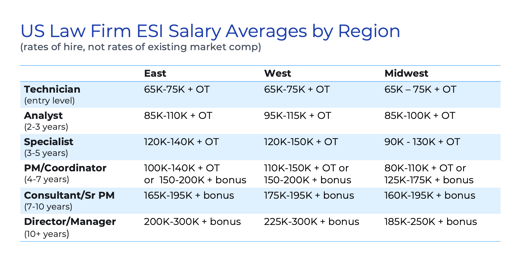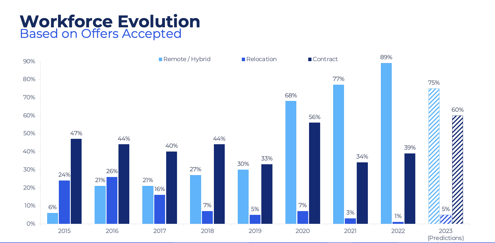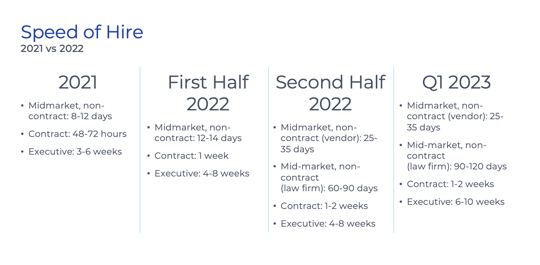Ediscovery Industry Slowing for Full-Time Jobs, but Lively for Contract Work
Contents
Eye on ESI for March 2023 was a lively panel discussion featuring Maribel Rivera and Michael Quartararo, both of ACEDS, and Annette Habib, Sr. VP of Recruitment and Account Management and Sarah Roberts, VP of Recruitment and Account Management, of TRU Staffing Partners. Rivera asked Roberts to start the discussion with an update on the monthly metrics covered during this webinar.
Speed of Hire Slowed More Since Last Quarter
Sarah Roberts: The speed of hiring has changed a lot since last year. We've slowed down a bit in the beginning of this quarter as compared to the first quarter of the last two years. However, we think the speed of hire will stabilize now. Law firms’ hiring has really slowed down, specifically because they're really holding out for people to come into an office. That's the biggest thing that we've seen over the last couple of weeks.
Annette Habib: Yes, last year the speed of hire was from seven to 15 days, now it could be over a month before a hire is made. I think that'll probably be the theme for the rest of this year.
Maribel Rivera: Excellent. What else do you have for us, Sarah?
Salary Averages Remain Steady

SR: The salary averages haven't changed too much since the last Eye on ESI meeting. But for entry-level technicians, the salary across the US has been $65k to $75k at the point of entry for people with really good, tenacious attitudes, but not much experience yet. We've placed several candidates in this range since we last touched on this in February. Some have been remote, some in-office.
Entry-level people have seen some barriers to entering the ediscovery industry, but those who are succeeding in getting placed are showing a great attitude and are working hard to gain practical experience. They have a general excitement about being in the industry and then are really taking the initiative and getting industry certifications. Certifications help put those individuals above others in the job market with more tech experience because employers want to invest in candidates who have invested in themselves.
Speaking of – I want to mention the TRU Scholarship Program. This is very relevant for people looking to gain experience in the ediscovery industry and set themselves apart. These scholarships allow professionals to invest in themselves and gain some of these different technology certifications that they might otherwise not be able to afford.
AH: Yes – we’ve officially launched our annual scholarship program. We've been doing this for about 12 years. This year, we have 10 partners, and the opportunities range from in-person to online training programs and prep for taking certification exams. One of our partners is ACEDS, who is offering one US and one Canadian training package. A new one this year is CDS Legal. They're offering a paid internship: it's at minimum a month-long, remote internship, up to 40 hours a week. They'll provide the winner with a laptop, materials, and training, and teach them how to use their Relativity instance. This is a great opportunity for an entry-level pro to get their foot in the door with an ediscovery company and get some real hands-on experience. We encourage everyone to view the information on our website, and to apply before the March 19 deadline.
MR: Awesome. Mike, any thoughts, what do you want to say about the TRU Scholarship Program?
Mike Quartararo: Well, ACEDS is super excited as always to be a part of it. We're trying to help lift people up. That's why we participate every year, and we have for many years, and we'll continue to do it.
SR: A common misconception is that the scholarships are only for entry-level people. There's a wide range and variety of scholarships. If you are more senior in the industry, you may benefit from training on some of the new tools that are out there. Or you may want to diversify your background and learn different areas. The scholarships TRU offers are for privacy, cybersecurity, and ediscovery at all levels, and I would encourage everybody to take a look.
MR: Yes, it's just going to make you more well-rounded, depending on what your roles are.
AH: It looks good on the on the resume as well. Taking these courses shows employers that you're being proactive and like learning new things. For example, if someone has been in the industry for a long time and doesn't have hands-on Relativity experience, they might win a scholarship, study Relativity, and become an RCA. It could help people be better, to be able to talk about their experiences with more authority and show potential employers that they're serious about their careers.
MR: We've got some questions in chat. I'm going to throw one at Annette and one at Sarah. Sarah, with a tightening economy and layoffs continuing for the next possible year, if not beyond, is contract work the prevailing thing right now?
Contract Workforce Continues to Grow

SR: So, from the slide, the contract workforce went up when we saw a potential recession coming. As organizations are figuring out what to do, they will lean even more on contractors. Currently, no one is going to get a salary deal (reduction) on a candidate, especially in a law firm. Those salaries on the salary slide are absolutely still holding. If you're willing to work in a hybrid capacity or go into the office for three days a week in a major city, you have a real opportunity to find a new role, either with a vendor or a law firm, and you can really increase your compensation. If organizations are looking for a deal, that's when they bring in contractors. Contractors hit the ledgers differently, and there are no benefits to pay.
Also, many of our clients leverage contractors from a quality-of-life standpoint to supplement their full-time employees. They might not need to hire a full-time employee. They can get more of a deal by hiring a contractor and scale up and down from an hours perspective. That's what we'll continue to see into this year.
MQ: It's a little cheaper to have a contractor. You don't have to pay them benefits or the other intangibles that cost money when you hire a full-time employee.
SR: It's less expensive from the organization's perspective. They're not having to invest in a full-time employee. They can scale up and down – it’s a win-win for everybody.
MQ: So it's easy to conclude that in a time of uncertainty, contracting is the right move.
AH: We've been seeing a lot of layoffs and companies might be preparing for a possible recession, but the workloads are still there. They may not have the headcount to bring on a full-time hire or there might be some hiring freezes in place. The way around that is to hire contractors. Folks need help so a contractor is a way to cover the work.
MR: On to our second question. This one is for Annette. How would you recommend a person goes about transitioning from a legal professional to an ediscovery position? And then for someone already in the industry who's gotten laid off: how do they transition into ediscovery contractor work? Some people may need a full-time job. So let's talk about both of those.
AH: First, look for certifications that would help get you through the door, whether it be Relativity or ACEDS, and learn more about the industry. That will look good on a resume. Second, join essential groups and associations, start to network, join groups on LinkedIn, and meet people in the industry. Attend key conferences. Legal Week is coming up in New York soon – go there and meet people. Third, go to the TRU website, apply for roles, and reach out to TRU recruiters to help introduce you to key employers. The right company will see how eager you are to break into the industry and provide an opportunity.
MR: You also must know what soft skills and applicable skills you have from other roles that you can use in a role as an ediscovery analyst or project manager. It might be that working with someone through an agency like TRU is easier because a recruiter will coach you on which roles are best for you.
AH: I always tell my candidates that a job description is more of a wish list because there's never one candidate that meets every bullet point on a job description. Employers are looking for the right candidate with the right attitude.
MQ: I have always viewed changing jobs as a numbers game. Apply for every open position there is, even if you don't qualify, get plenty of practice interviewing. It is a skill to a certain extent. You're going to fumble through those interviews. But eventually someone's going to see the worth in you offer you a job. Just keep going, don't get discouraged. That's my best advice for job searchers in any industry.
MR: I go back to what Annette said: be in the room, listen to what people are asking, learn what their questions are, what their answers are. Ask questions. People will point you in the right direction or provide you the answers that you need so that you can continue to build up your knowledge.
MQ: I think a lot of people walk away from an interview where they were not successful, and they think they lack something or made mistakes. But many full-time hires are about fit and attitude. Your skills are what your skills are, your resume should outline your skills. It's so important that you impress during the interview and show that you're a team player or you're going to have the right attitude. That's almost more important than your skills because you can learn new stuff. You can't change who you are.
SR: I agree. What’s interesting right now is that law firms are desperate and we're going to see them make concessions in certain areas. They are a little bit less concerned about fit or culture as they are about skill sets. And, in certain roles, they consider the level of position as well. I don't think that means to not get trained or get certified or prepare well, but I think the one place where organizations are less concerned about fit or culture is within law firms. They really need people to come in because the work is still there, and they need to make an immediate impact.
MQ: That concept changes when you're talking about leadership.
SR: Those roles are absolutely few and far between because people go into those roles and stay. Those leadership positions and those people that either feel stagnant or they don't have that next step, that's where diversifying your skillset will really differentiate you. So when leadership roles do open up, you can stand out from other people in the same type of role.
AH: You actually never know what's going to happen during an interview. You could be interviewing for one position, and by the end of it, you might get offered a completely different role. So after getting to know you, what you bring to the table, there may be another opportunity that is a better fit for you. It's always good to have those conversations. It never hurts to take an interview and learn more about the company and what they have to offer.
MR: We've got another question: Some law firms have had layoffs of support staff. We saw a few earlier this week, citing market conditions, looming possible recession. Are we likely to see more?
SR: This is more company-specific than a trend, especially in law firms. That might change, but now, it’s not a trend.
MQ: Having spent most of my career at big law, I know how this goes. I don't think it's changed that much. There are some variables here. Market conditions is one factor. Law firm CFOs look at the bottom line and decide to cut salaries. It's the most expensive part of the operation. Another factor is talent. You've got some talent you're not entirely happy with. Good time to make a change because others are doing it. So it's a mixed bag.
SR: There is a strategy to utilize outside resources and, if that's the case, they will end up hiring back and utilizing the same people that were just let go because they must get the work done somehow.
MQ: In the same breath that I'm hearing about layoffs, I'm hearing about hiring. I don't see any widespread trends. But a lot of the things that happen at law firms do not get attention. So we call them the quiet layoffs. I've read about five or six firms that have laid off in the last two months. That's very few.
Attending Legalweek? Meet TRU there!


